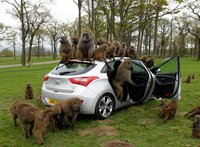Baboons Go Ape Over Hyundai 130 Family Hatchback +VIDEO
• Car parts and interior subjected to wear and tear of over 40 monkeys
• Hard-wearing hatch survives toughest challenge yet
HIGH WYCOMBE, England - May 14, 2012: There was plenty of monkeying around last week when Hyundai setunderwent the ultimate wear and tear challenge for its new family car.
In the first endurance test of its kind in the UK by a car manufacturer, cheeky safari park baboons were let loose on Hyundai’s New Generation i30 hatchback.
The car has been specially-designed for families and their ‘little monkeys’ in the back, with extra strong materials used to build the interior, easy wipe plastics, tough fittings and a special high quality steel used for the bodywork.
Baboons from Knowsley Safari Park were chosen for their well-known love of tearing park visitors’ cars apart – most famously Wayne Rooney’s vehicle when he visited the Merseyside attraction last year.
And it was monkey business as usual when Hyundai parked its i30 family car in the baboon enclosure, as it was immediately besieged by dozens of the park’s primates. But 10 hours later the car emerged virtually unscathed.
Watch the baboons try to take the i30 apart
The monkeys simulated the punishment that the children of a typical family subject a car to: jumping up and down on seats, pushing and prodding buttons and opening and closing storage bins. They even checked the durability of cupholders with plastic drinking beakers!
Outside, the paintwork was smeared and scraped, but the hard-wearing paint protected the car from significant scratches and chips.
Meanwhile, other baboons tested the fabric of seats by eating their lunch in the car and some played with their toys in the i30’s sizeable boot.
• SEE ALSO: Hyundai Buyers Guide
As well as confirming the robust quality of its New Generation i30, Hyundai hopes lessons learnt from the monkey tests can inform the research and development of future cars.
Felicity Wood, i30 Product Manager at Hyundai, said: “At Hyundai we believe in new thinking, which is why we decided to take a new approach with this durability test. You have to be pretty brave to subject a car to the most rigorous quality testers in the world, and the monkeys certainly gave our New Generation i30 a thorough examination! The fact that it survived with only a few scrapes is testament to the way a modern Hyundai is designed and engineered. We really do give a monkey’s about building tough cars!”
To give something back to monkeys for their help, Hyundai has donated £1,000 to one of Knowsley’s supported charities, the Primate Society of Great Britain, which dedicates its work to conservation and captive care of new and old world monkeys, gibbons and apes.
“For a baboon, to have a car to play with for a whole day is manna from heaven!” says David Ross, General Manager at Knowsley Safari Park. “I’ve seen thousands of cars pass through this enclosure, get mobbed by monkeys, and none have lasted the distance as well as this Hyundai. These baboons are incredibly inquisitive. If you put them on any car they will scour it for the weak points and find any faults. At one point there were 40 monkeys in the car, pushing it to its limits – that’s ten times the size of the average human family!”
About Knowsley Safari Park
Knowsley Safari Park is based in Merseyside, on the outskirts of Liverpool. Situated around Knowsley Hall on the ancestral estate of the Earl of Derby, the reserve is home to many different animals including elephants, giraffes, lions, tigers and baboons. http://www.knowsleysafariexperience.co.uk
Baboon facts:
Papio hamadryas baboons can live up to 30 years.
They can grow up to 1-metre in length (not including tail).
Baboons live in troops that can include hundreds of members.
Wild baboons live in Africa and Arabia
Baboons eat a wide range of food, from seeds and fruit, to birds and rodents



